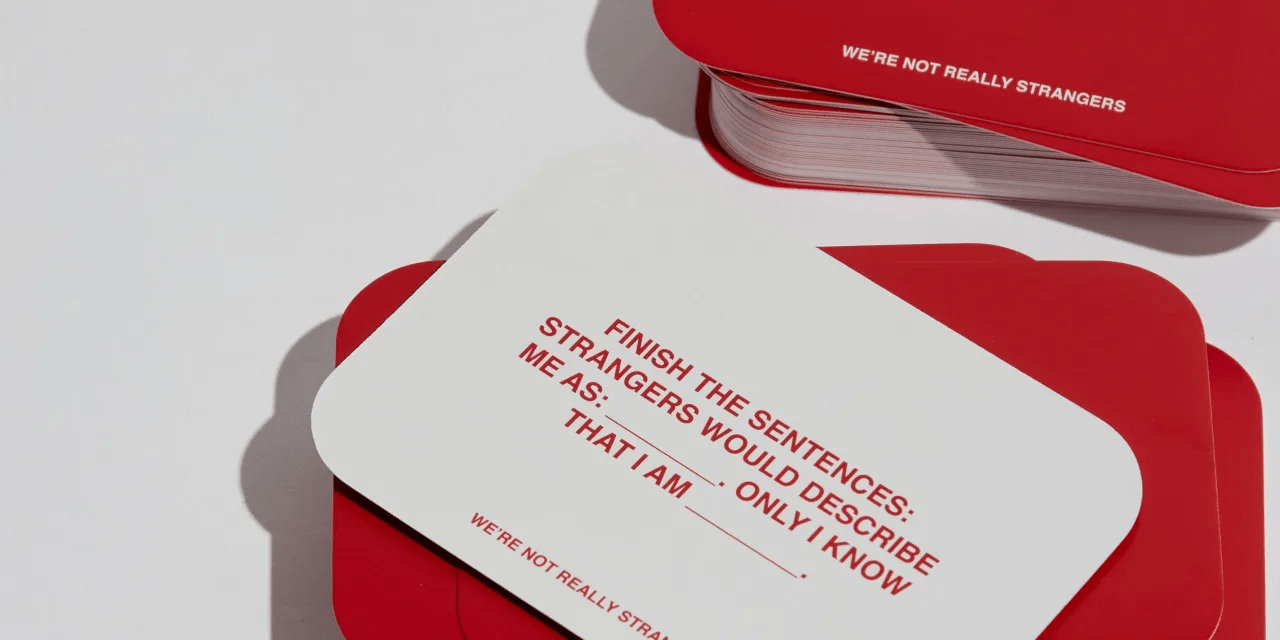We’re Not Really Strangers is a get-to-know-you game optimized for two players. It is a card game made by Koreen, a model and artist based in LA. The target audience is adults looking to get to know another adults. We’re Not Really Strangers markets itself mostly toward strangers, but you can play it with your friend (as I did).
Both We’re Not Really Strangers and our improv game, Plus Ones, require a certain level of intimacy – the game functions when players “buy in” and invest vulnerability. They are, in a way, both guided vulnerability. The games differ, however, in their method of achieving intimacy. In We’re Not Really Strangers, the game asks you to reveal more and more intimate real facts about yourself. In our game, intimacy and fellowship is developed through the creation of a shared fantasy or narrative.
For context: Plus Ones is basically guided improv. The premise is that you are all plus ones at a table at a wedding, and you have no idea who you are. Each player draws a role that includes an adjective and a noun (“Zesty beekeeper,” “Victorian soccer mom”) that they embody for the game. You have “goals” as cards, which really are funny/weird actions you can play each round (though this is up in the air) – basically, ideas for your improv. Each round consists of an event, with an event and a thought-provoking prompt (“A bee hive storms the wedding. Explain.”) Chaos and absurdity ensue!
Both Plus Ones and We’re Not Really Strangers have the same core aesthetic in mind: fellowship, which means vulnerability. In We’re Not Really Strangers, for example, the “dig deeper” mechanic – a card that you can offer to your co-player if you feel like they are not “digging deep” enough – encourages players to invest more and more vulnerability into the game. My friend Miranda and I didn’t really use this mechanic, but we thought it was a super neat idea – I could see myself using that card in another scenario, really easily. The game also advances through levels of cards, each with increasing amounts of intimacy, as the game goes on. In this way, it gets players who are strangers or friends normally uncomfortable with intimacy to slowly become more and more vulnerable as the game goes on.
(Side note: when I played it with Miranda, we actually didn’t experience this – we found that the cards sometimes got less interesting with each level, and that the “level one” cards were the most interesting to play with… but this may also be because we are good friends already.)
Our concept tries to get at the same thing through improv: improv, counterintuitively, requires players to be “truthful.” There is something about make-believe, and indulging in pure creative expression, that is incredibly intimate, because you are vulnerable to critique when you are improvising. We have tried to engineer ways to expand the power of the “magic circle”: having people invent new names for themselves during the first round, and “introducing” this new version of themselves in their roles. When we play-tested this, I felt like this was actually how it does happen. I’ve always thought that I’ve been bad at improv, but as “guy who came back from studying abroad in Amsterdam,” by calling myself “Gary,” I found that I was better able to let go of my own inhibitions. As a process of playtesting our own game, my team developed also inside jokes based on the absurd events that happened in game! Even though it isn’t part of the game (yet?), we would also prod each other to try to get each other to share more of our made-up backstories – kind of like the dig deeper mechanic in We’re Not Really Strangers!
The difference between Plus Ones and We’re Not Really Strangers lies in the way that they try to develop intimacy. In We’re Not Really Strangers, it’s through asking more “real” questions each round. It’s straight up getting to know the other person. I learned a lot about Miranda through playing it: because we could play it however we wanted, we optimized the game for our own enjoyment, as players who are already close friends. We became more vulnerable and “real” as the game progressed. In Plus Ones, vulnerability is developed through the creation of a shared narrative. The more I think about it, actually, Plus Ones resembles Cards Against Humanity more so than We’re Not Really Strangers: it’s people who have to try to be funny together (by making things up), which makes people have a fun time, and thereby bond. We were playtesting it at first with “goals” (secret objectives), but the funniest moments happened when the “goals” were like “plays.” One of my goals was “get someone to give you $100,” and another player’s goal was “get someone to your MLM.” But we were both extremely obvious about it and had a ton of fun helping each other fulfill our respective goals because it made the overall improv narrative super absurd.
So Plus Ones isn’t really We’re Not Really Strangers, and they don’t have very much in common except for that core aesthetic. But I think playing We’re Not Really Strangers helps me think about ways that we could get people to “let go” and “buy in,” especially with the “dig deeper” mechanic.



